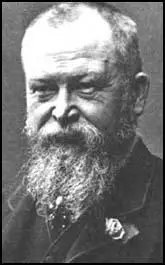Henry Broadhurst

Henry Broadhurst, the son of a stonemason, was born at Littlemore on 13th April, 1840. After a brief schooling he started work at the age of twelve. A brief spell as a gardener was followed by an apprenticeship as a stonemason in Oxford. A staunch Methodist, Broadhurst's work mainly involved repairing and enlarging churches and university colleges.
In the late 1850s Broadhurst moved to Norwich where he found work as a stonemason. In 1865 Broadhurst and his new wife, Eliza Olley, moved to London where he was involved in rebuilding the House of Commons.
While in London Broadhurst became involved the struggle for universal suffrage. He joined the Reform League and took part in several demonstrations and meetings in the build up to the passing of the 1867 Reform Act.
In 1872 Henry Broadhurst took part in the campaign to reduce the working week and an increase in the hourly wage paid in the building industry. Broadhurst soon emerged as one of the leaders of the stonemasons and took part in the negotiations with the employers. Broadhurst now gave up his work as a stonemason to become a full-time union official. Later that year Broadhurst represented the Stonemasons Union at the annual Trade Union Congress (TUC) and was elected to its Parliamentary Committee.
In 1873 Broadhurst was elected secretary of the Labour Representation League, an organisation that was attempting to enable working men to be elected to the House of Commons. The LBR sponsored thirteen trade union candidates in the 1874 General Election, and two of them, Alexander MacDonald and Thomas Burt, were elected as Lib-Labs MPs.
Broadhurst played an important role in the campaign to have the Masters and Servants Act repealed and in 1875 the Conservative government, led by Benjamin Disraeli, agreed to the TUC's proposals. As a result of the Conspiracy and Protection of Property Act was passed by Parliament in 1875, which secured the right to participate in peaceful picketing.
The following year Henry Broadhurst supported William Gladstone and his campaign against Bulgarian Atrocities. Broadhurst obtained the signatures of over 15,000 people, including many trade union leaders, to a petition which John Bright presented to Parliament.
In the 1880 General Election Broadhurst was elected as Liberal MP for Stoke-upon-Trent. Broadhurst joined Alexander MacDonald and Thomas Burt as Lib-Lab supporters of Gladstone's government. In the House of Commons Broadhurst led the campaign for a government commission to investigate working-class housing. In the 1885 General Election Broadhurst was elected for the Bordesley seat in Birmingham.
After the election, William Gladstone offered Broadhurst the post of Under-Secretary at the Home Office. When Broadhurst accepted the post he became the first working man to become a government minister. Broadhurst's loyal support of the Liberal government upset some trade union leaders. When Broadhurst argued against the eight-hour day, James Keir Hardie remarked that the minister was more Liberal than Labour.
At the 1889 Trade Union Congress Hardie argued that Henry Broadhurst was guilty of holding shares in a company that treated its workers badly. The following year, the TUC supported Hardie against Broadhurst by passing a resolution in favour of the eight-hour day. Broadhurst was especially hurt when he discovered that the Stonemasons Union had voted against him. In the 1892 General Election Broadhurst was defeated at West Nottingham. His objection to the eight-hour day had lost him the support of local workers and this enabled a local colliery owner to defeat him.
Broadhurst was opposed to women's suffrage. A young Beatrice Webb met him in September 1889: "He chatted on about socialism, trade unionism and his own complaints and showed every sign of being confidential. A commonplace person, hard-working no doubt, but a middle-class philistine to the backbone, appealing to the practical shrewdness and the high-flown but mediocre sentiments of the comfortably off working man. His view of women is typical of all his other views: he lives in platitudes and commonplaces."
Attempts to be elected in Grimsey in 1893 ended in failure but Broadhurst eventually won at Leicester in 1894. He held the seat until his retirement before the 1906 General Election.
Henry Broadhurst died at Cromer, Norfolk, on 11th October, 1911.
Primary Sources
(1) Beatrice Webb met Henry Broadhurst in Dundee in September, 1889.
With Broadhurst I lunched and afterwards smoked a cigarette. His suspicions of my intentions were completely dissipated when he heard I was an anti-suffrage woman. He immediately thought me sensible and sound. "When I hear a woman's name talked of I am immediately prejudiced against her, but I can see you are as different as pitch from diamonds." So he chatted on about socialism, trade unionism and his own complaints and showed every sign of being confidential. A commonplace person, hard-working no doubt, but a middle-class philistine to the backbone, appealing to the practical shrewdness and the high-flown but mediocre sentiments of the comfortably off working man. His view of women is typical of all his other views: he lives in platitudes and commonplaces.
Student Activities
The Outbreak of the General Strike (Answer Commentary)
The 1926 General Strike and the Defeat of the Miners (Answer Commentary)
The Coal Industry: 1600-1925 (Answer Commentary)
Women in the Coalmines (Answer Commentary)
Child Labour in the Collieries (Answer Commentary)
Child Labour Simulation (Teacher Notes)
1832 Reform Act and the House of Lords (Answer Commentary)
The Chartists (Answer Commentary)
Women and the Chartist Movement (Answer Commentary)
Benjamin Disraeli and the 1867 Reform Act (Answer Commentary)
William Gladstone and the 1884 Reform Act (Answer Commentary)
Richard Arkwright and the Factory System (Answer Commentary)
Robert Owen and New Lanark (Answer Commentary)
James Watt and Steam Power (Answer Commentary)
Road Transport and the Industrial Revolution (Answer Commentary)
Canal Mania (Answer Commentary)
Early Development of the Railways (Answer Commentary)
The Domestic System (Answer Commentary)
The Luddites: 1775-1825 (Answer Commentary)
The Plight of the Handloom Weavers (Answer Commentary)
Health Problems in Industrial Towns (Answer Commentary)
Public Health Reform in the 19th century (Answer Commentary)
Classroom Activities by Subject
